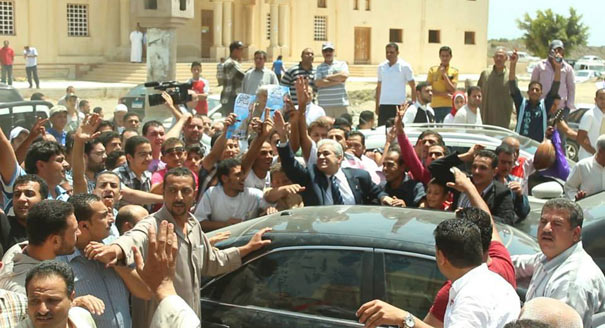Egyptian presidential candidate Hamdeen Sabahi—the only challenger to Field Marshal Abdel Fattah el-Sisi for the presidency—will likely fail to capture a significant share of the vote in the upcoming election, scheduled for May 26 and 27. However, the veteran opposition politician has taken advantage of the campaign to challenge certain narratives surrounding Sisi’s candidacy. In television appearances, comments to the press, and his lengthy platform, Sabahi has emphasized democratic reforms and social justice and taken a nationalist stance on foreign policy. His positions are summarized below.
Democratic Reforms
Since the military, led by Sisi, removed then Egyptian president Mohamed Morsi on July 3, 2013, Sabahi has argued that Sisi is a national hero but that the field marshal—and the army—should step back from politics. Sabahi has maintained this posture during the campaign, stressing the need for a civil, democratic state and saying at a recent campaign rally that “the army . . . must not rule.” In an interview with Egyptian television hosts Magdy al-Gallad and Khairy Ramadan, Sabahi claimed that the military is the property of the people and its leaders should be subjected to civilian oversight.
During the same interview, Sabahi followed Sisi’s lead and rejected the idea of an active Muslim Brotherhood presence under his presidency. He did, however, also criticize the security forces’ violent dispersal of a Brotherhood-led sit-in at Rabaa Square in August 2013 for excessive casualties. Sabahi said he would amend Egypt’s controversial law effectively banning protests, which he views as unconstitutional. He has criticized the imprisonment of revolutionary youth, claiming that there would be no prisoners of conscience under his administration.
Foreign Policy
Sabahi has adopted nationalist positions that challenge Egypt’s current foreign policy stance. Contesting Sisi’s attempts to restore the U.S. aid relationship, he has said that he would not accept aid from Washington—including for the military—although he would maintain relations with the United States on issues that are in Egypt’s national interest.
In addition, Sabahi has suggested that he would amend the peace treaty with Israel so that Egypt has freedom of movement in the Sinai, but he has also stated that he would honor all treaties even if he personally opposed them. He has spoken of maintaining a partnership with the Gulf states.
Economic Policy
In contrast to Sisi, who has attempted to straddle the free market–public sector divide while offering something to both rich and poor, Sabahi has framed his economic messaging squarely around social justice. His economic platform calls for fighting poverty and eliminating unemployment. He wants to activate millions of small and medium projects—for industry, agriculture, and tourism—in the four years of his presidency. He refers to privatization as a “massacre” and calls for the county’s remaining state-owned companies, a source of “national wealth,” to be reformed, strengthened, and saved. Among other issues, the platform also discusses goals for developing Upper Egypt, strengthening the education system, building solar- and wind-power capacity, and expanding pensions and healthcare.





